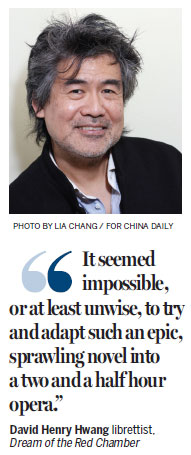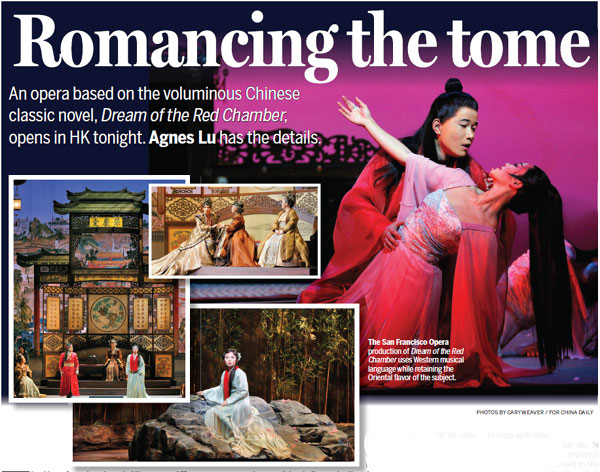Romancing the tome
Updated: 2017-03-17 08:02
By Agnes Lu(HK Edition)
|
|||||||
An opera based on the voluminous Chinese classic novel, Dream of the Red Chamber, opens in HK tonight. Agnes Lu has the details.
The idea of turning the Chinese literary masterpiece Dream of the Red Chamber into a two and a half hour opera in English would seem a daunting task. After all, here's a novel in 120 chapters, running to 2,500-pages in English translation.
Hailed as one of China's four great classic novels, the book, an 18th-century Qing Dynasty (1644-1911) product believed to have been written by Cao Xueqin, has been adapted on stage and screen several times, including a much-lauded 36-episode TV series broadcast in mainland China in 1987. There is even a field of study named "Redology", devoted exclusively to Cao's epic novel.
Chinese-American musician Bright Sheng and Tony Award-winning playwright David Henry Hwang have managed to compress the book's encyclopedic vastness into the opera format rather well, creating a piece using western musical language while still retaining the Oriental tone of the subject. The opera, which retains the title of the novel, received rave reviews in the United States on its debut in San Francisco last September. Tonight Dream of the Red Chamber, a co-production between San Francisco Opera and the Hong Kong Arts Festival will have its Asian premier at the Hong Kong Cultural Centre.

When Sheng first invited him to write the librettos for Red Chamber, Hwang was hesitant about taking it on. "It seemed impossible, or at least unwise, to try and adapt such an epic, sprawling novel into a two and a half hour opera," Hwang remembers. Eventually he was taken in by Sheng's vision about the way he wanted to approach the classic story, to say nothing of the sheer determination Sheng displayed. They decided they would both work on the libretto, a form where the structure was as important as the text.
They ended up paring down the novel's several hundred characters to eight - seven singing and one speaking parts. The story is built around a central love triangle between the young nobleman Bao Yu of the swiftly declining Jia clan and two women - Bao Yu's spiritual soulmate Dai Yu and his future wife, the very beautiful Bao Chai.
Stan Lai, who directed the opera, quickly saw the benefit of the two librettists' somewhat audacious move to drastically reduce the number of characters in the novel. "I believe the decision to cut most of the characters and leave only the bare nucleus was a brilliant decision that gave us perhaps the only chance of letting an audience make sense of such a sprawling and intricate narrative," he said. "By concentrating on the love triangle, we were able to let the political intrigue seep through, along with the sophisticated lifestyle that displays the quintessence of Chinese life and thought."
He remembers reading the novel in college. The glamour and intricacy of the depiction of aristocratic Chinese life had struck him profoundly, as did the prominent Buddhist and Taoist themes throughout the story. This, however, turned out to be one of the challenges in directing the opera, as it required cogitative directorial interpretation to give prominence to Buddhist and Taoist ideas such as impermanence and karma.
Hwang, on the other hand, had never read the novel before embarking on the project. He described himself as "impressed and moved by how it immerses the reader in a comprehensive and kaleidoscopic vision of a China that existed long ago" after reading it the first time. For him not knowing the novel before was a bonus. It helped him devise an easy passage for the audiences who would be coming to the story for the first time through the opera. Having been born and raised in the United States, he could bring a distinct Western perspective to the table. Everybody else on the creative team had Chinese roots but with very diverse individual histories.
The advantage of working with classic material is that with a few tweaks here and there, the original story would resonate well with a present-day audience. Apart from the obvious tension between passion and romantic love, Hwang and Sheng decided to highlight two other aspects. One of these was the spiritual and Buddhist foundation of the book, the reason why the novel's metaphysical setting was retained in the opera. Also the librettists decided not to shy away from the political intrigue described in the book. "So our opera follows the House of Cards-like subplot of the Emperor's manipulation of the Jia family's debt to bring down the clan," Hwang said.
The biggest challenge in adapting a written narrative to the opera form, he says, had to do with the constraints of time. "Because it takes so much longer to sing 'I love you', for instance, than to say that phrase the book's beautiful and elaborate poetry becomes much more difficult to capture."
The Hong Kong version of the opera opening tonight would not be much different from the production premiered in San Francisco, except perhaps a slight trimming of the length, says Hwang. Amanda Li, an experienced Hong Kong soprano, will take on the role of Bao Chai for the first time. She said watching the performances back in San Francisco had moved her to tears each time.
Li sees the character she is playing as someone practical and generous, as opposed to the sentimental Dai Yu. Bao Chai too, goes through a lot of ups and downs in her pursuit of love, and again when her marriage with Bao Yu fails, she points out. "Her emotional instability in that scene really resonates with me," Li said.
She feels for all the novelty introduced in the current production, deep down, it remains fundamentally Chinese. Is she a little apprehensive though about how well the show will go down in Hong Kong, a city with deep roots in Chinese culture?
"It is a great effort, condensing the epic into a two and a half hour opera, so I wouldn't be surprised if anyone feels there's something missing," she says, drawing attention to the fact that novel and opera are two distinctly different media having their own parameters.
Lai is curious to see if this Chinese classic tale presented in English alienates or draws in a Hong Kong audience. "It is an unusual aesthetic approach, but perhaps valid because audiences in Asia today may know just as little or as much about Dream of the Red Chamber as audiences in San Francisco," he said.

(HK Edition 03/17/2017 page1)